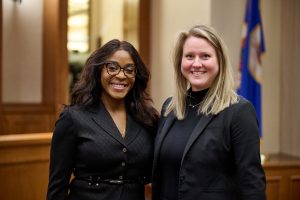A distinguished Air Force veteran, Tacota LeMuel ’24 has spent an impressive amount of time as a law student arguing before the state’s highest courts.
 Around 9:30 on the morning of April 2, 2024, Mitchell Hamline law student Tacota LeMuel walked to the podium in the Supreme Court chambers at the Minnesota State Capitol. An assistant attorney general had just finished presenting the state’s arguments for why a drug conviction for LeMuel’s client, Jeron Garding, should be affirmed. It was now LeMuel’s job to persuade the justices to affirm a lower court ruling reversing the conviction.
Around 9:30 on the morning of April 2, 2024, Mitchell Hamline law student Tacota LeMuel walked to the podium in the Supreme Court chambers at the Minnesota State Capitol. An assistant attorney general had just finished presenting the state’s arguments for why a drug conviction for LeMuel’s client, Jeron Garding, should be affirmed. It was now LeMuel’s job to persuade the justices to affirm a lower court ruling reversing the conviction.
Her supervising attorney, Mitchell Hamline Professor Ted Sampsell-Jones, was at the respondent’s table a few steps away, but for the next 20 minutes or so it would just be LeMuel speaking to the
justices and answering their questions.
“Welcome, Ms. LeMuel,” said Chief Justice Natalie Hudson. “It’s always good to have student attorneys argue before us. We don’t have that often.”
Law students like LeMuel don’t come around often. Her appearance at the Supreme Court that day, combined with the fact that she had previously argued three times before the Court of Appeals, is likely an unprecedented experience for a law student.
A handful of Mitchell Hamline students might argue at the Court of Appeals each year, Sampsell-Jones said. He can’t recall any in his 17 years that have argued at the Supreme Court. But to argue three times at the appeals court plus once at the Supreme Court? “I doubt any student in Minnesota has ever done that.”
‘She does not get rattled’

Tacota with Mitchell Hamline Professor Ted Sampsell-Jones, 2024. (Steve Woit)
LeMuel came to law school knowing she wanted to do criminal appellate work. She worked with Professor and Interim President and Dean Jim Hilbert to conduct research on no-knock warrants, and he suggested she work with Sampsell-Jones, who was taking the Garding case to the Court of Appeals to argue certain evidence should not have been permitted in the initial trial. But instead of just helping on the case, Sampsell-Jones suggested LeMuel handle the arguments at the Court of Appeals, set for July 2023.
“Tacota has an unusual amount of maturity and poise for a law student, in part due to her background—she is a mom, and she served in the military for a decade before law school,” said Sampsell-Jones. “I could tell that she has a great courtroom presence. She also has a very effective style—she is very calm, and she makes arguments in a very straightforward, commonsense fashion. She does not get rattled.”
Sampsell-Jones’ confidence in LeMuel was well-placed. “She did an excellent job at the Court of Appeals argument,” he said. “Numerous experienced attorneys viewed that argument, and they were amazed to see a law student perform that well in court.” The Court of Appeals ruled in LeMuel’s favor in September, but the decision was appealed in December, and the case moved to the Supreme Court.
Once again, Sampsell-Jones wanted LeMuel to present the argument, and the Supreme Court agreed, providing LeMuel with what she called “an incredible honor and, frankly, a dream.”
“Being around such brilliant legal minds was intimidating and inspiring at the same time,” she said of her appearance at the high court. “The first five minutes of the argument I was extremely nervous, but after I responded to a few questions, I felt more comfortable and started to speak more confidently. In the moments where I felt the most nervous, I kept thinking about our client and how I could best articulate the legal authority and the facts in the record to support our client’s position.”
The Supreme Court reversed the decision of the Court of Appeals, but regardless of outcome, LeMuel did a great job once again, Sampsell-Jones said. And she got some informal validation after the argument. As Sampsell-Jones and LeMuel reached the Capitol Rotunda after walking down the stairs from the courtroom, they heard people behind them. They were four students—all of them students of color—from a visiting high school group that had been in the courtroom during LeMuel’s case. “They ran up and told Tacota how great she did, how inspiring it was to see her up there. They thanked her and said it was an honor to see her in action,” Sampsell-Jones said. “It was really a cool moment.”
Early career in the Air Force

Staff Sgt. LeMuel reviews her maintenance checklist during post-flight maintenance, at Lackland Air Force Base, 2010. (U.S. Air Force/Staff Sgt. Larry E. Reid Jr. The appearance of U.S. Department of Defense (DoD) visual information does not imply or constitute DoD endorsement.)
LeMuel, who graduated this spring, came to law school after a career in the Air Force. She joined in 2006 and was deployed to Iraq at age 19, serving on the crew that supported fighter pilot missions. She was later stationed in South Korea, where she was selected to join the Thunderbird team based on her skills as an aircraft mechanic. The Thunderbirds are a demonstration squadron that showcases its skills around the globe. After earning her Thunderbird patch, LeMuel learned she was the first Black woman to ever serve as Thunderbird crew chief. “It was and still is a huge honor and one of the biggest moments of my life,” she said.
LeMuel was last stationed in Las Vegas before separating from active duty and serving as a full-time reservist. In her civilian life, she became a paralegal and attended every one of her boss’s court appearances for several years.
It was when her boss argued before the 9th Circuit Court of Appeals that LeMuel realized she wanted to be a lawyer and focus on appellate work. “We had worked on that case for so long, and it
was gratifying to see what I worked on come out in that argument in real time,” she said. The case was about a defective airbag, but LeMuel knew she wanted to work in criminal law.
Just like her argument in the Garding case, LeMuel’s second and third arguments at the Court of Appeals had to do with criminal law. And both stemmed from her clerkship at the Hennepin County Attorney’s Office, where she worked during much of law school.

Tacota with supervising attorney Nicole Cornale ’18, 2024. (Paul Markert)
In January 2024, she argued a case having to do with whether a search was correctly conducted. She was arguing it was, and her side wound up prevailing. At the end of arguments, supervising attorney Nicole Cornale ’18 received texts from colleagues watching online who were sending praise. “Tacota is practicing beyond her years,” said Cornale. “Though she is just getting started in her career as an attorney, she is going to do great things in pursuit of justice.”
LeMuel was back at the Court of Appeals in March 2024, arguing once again on behalf of the state, this time against a man challenging his third-degree murder conviction and the length of his sentence. The Court of Appeals ruled in the state’s favor in May, and the man’s attorney subsequently submitted a petition for review to the Minnesota Supreme Court.
End of law school and next steps

Tacota with her son at Mitchell Hamline’s
commencement, 2024. (Steve Woit)
LeMuel didn’t slow down as she prepared to finish law school. Last year she served as an officer in Mitchell Hamline’s Criminal Law Society and she was recently selected as a research fellow in the Legal Education Police Practices Consortium with the American Bar Association.
When she applied to Mitchell Hamline’s blended-learning program, the idea was to attend law school while living in Las Vegas. But she decided at the last-minute to move to Minnesota. She switched to the on-campus enrollment option in her second year and now plans to take the Minnesota bar and clerk for Court of Appeals Judge Peter Reyes ’97.
LeMuel says she feels fortunate to have had the chance in law school to argue at the appellate level on behalf of both the state and a criminal defendant. She says both prosecutors and defense attorneys she has worked with acknowledge deficiencies in the criminal justice system and the need for reform. “I view criminal appellate work as a way to help address, and hopefully one day change, some of those issues.”
She’s grateful to Mitchell Hamline for the chance to get some practical experience toward her goal. “It’s great that students at Mitchell Hamline are positioned to work with professors that are still working and still heavily involved in significant legal work outside of school,” she said. “It shows the school’s commitment to creating strong legal practitioners and to continue to work on places in the criminal justice system that need reform.”

